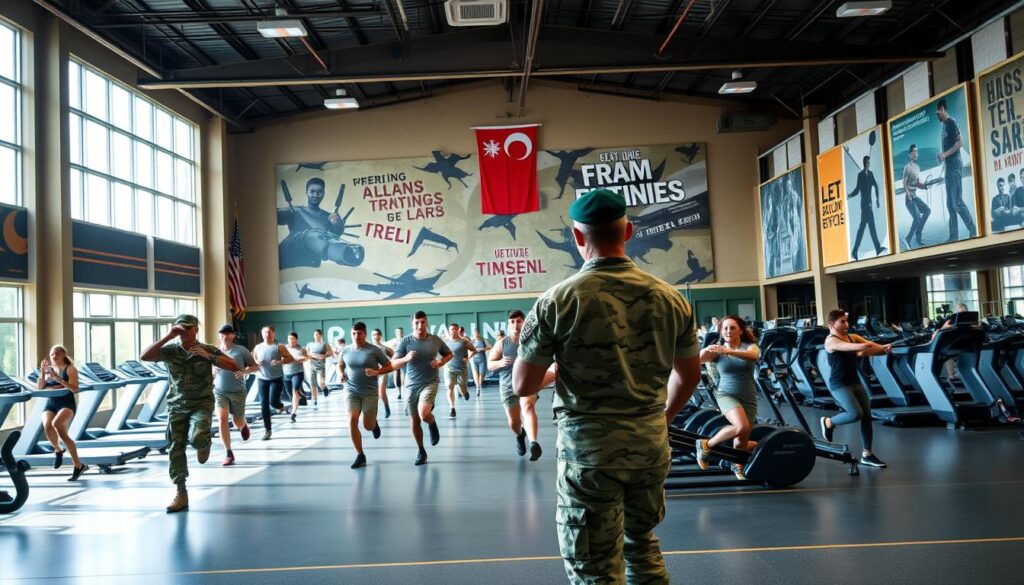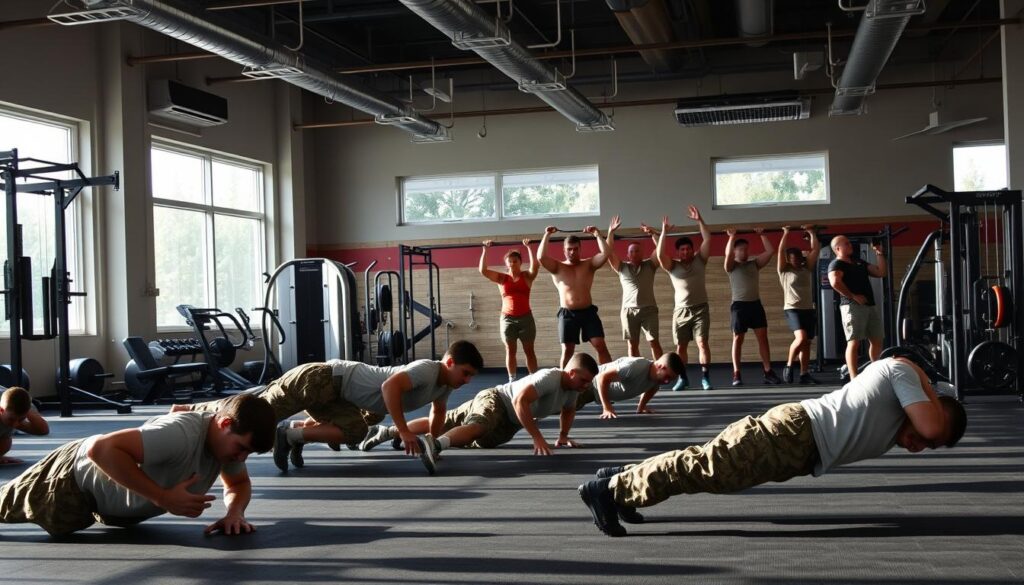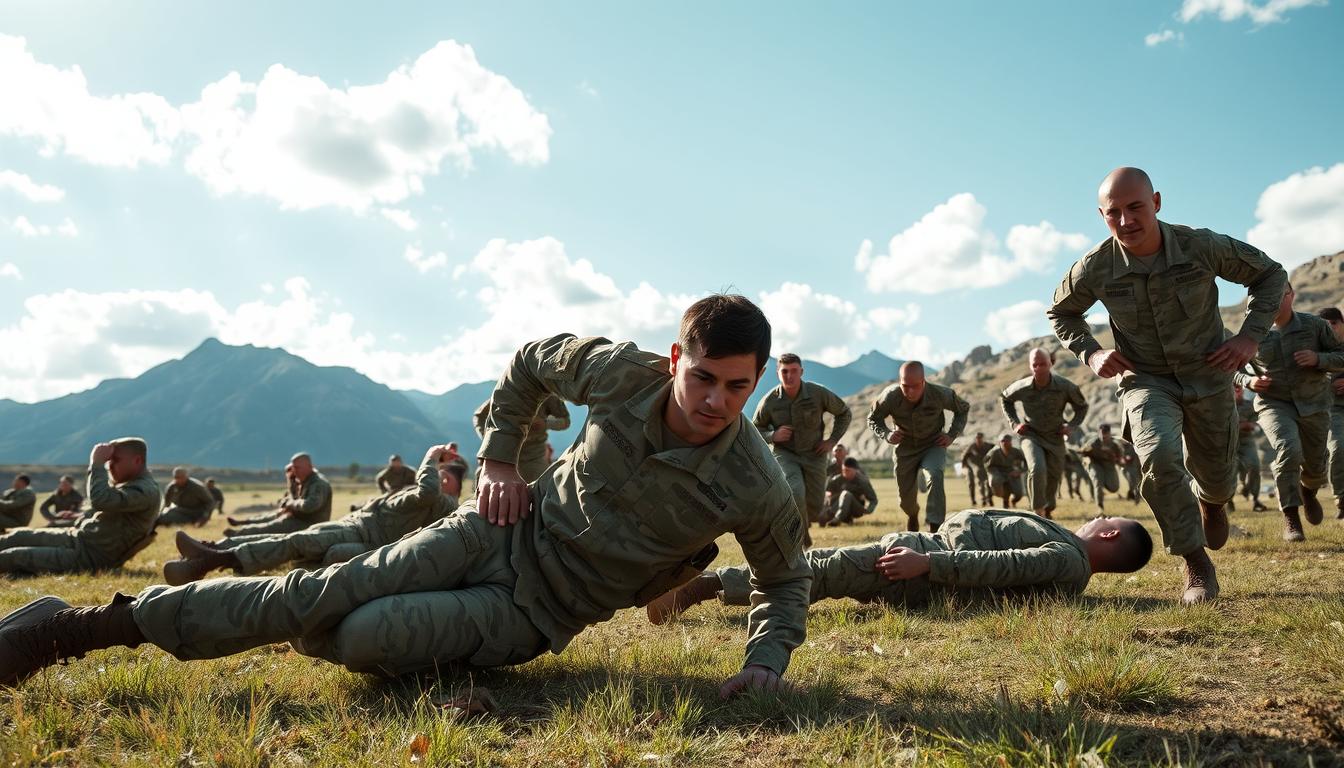Physical fitness is key for military readiness. The Army Combat Fitness Test (ACFT) has changed how soldiers get ready for duty.
The ACFT has six tough events: MDL, SPT, HRP, SDC, PLK, and 2MR. These tests check a soldier’s fitness and readiness.
If you’re starting a fitness plan, knowing the ACFT is important. It’s not just about passing a test. It’s about building a strong, healthy you.
Key Takeaways
- Understand the six events of the ACFT.
- Learn how to prepare for the ACFT.
- Discover the benefits of the Army fitness program.
- Start your fitness journey with a clear plan.
- Achieve a higher level of physical readiness.
Overview of the Army Fitness Program
The Army Fitness Program is a tough workout plan. It aims to boost strength, endurance, and aerobic fitness. It’s great for both beginners and experienced athletes looking to reach their fitness goals.

Goals of the Army Fitness Program
The Army Fitness Program’s main aim is to get soldiers and units ready. It’s designed to boost fitness and prepare for military life. The Army says, “The ACFT is designed to enhance soldier and unit readiness while improving the army’s fitness culture.”
Key objectives include:
- Improving muscular strength and endurance
- Enhancing aerobic capacity
- Promoting overall physical fitness and well-being
Importance of Physical Fitness in the Army
Physical fitness is key for military readiness. It lets soldiers do their jobs well and handle tough situations. Military experts say it’s not just about passing tests; it’s about being ready for military life.
“Physical fitness is a vital aspect of military preparedness, and it’s essential for soldiers to maintain a high level of fitness to perform their duties effectively.”
Who Can Participate?
The Army Fitness Program is for everyone, from beginners to pros. It’s perfect for those wanting to get fitter or prepare for the military. The program offers a structured and supportive place to reach your fitness goals.
It’s great for those wanting a military-inspired fitness challenge. By following the program and adding beginner workouts to your routine, you can boost your fitness and readiness.
Key Components of the Fitness Program
The Army Fitness Program has several key parts that work together. It aims to boost physical fitness and prepare for military tasks. The program includes exercises that cover different fitness areas.
Cardiovascular Training
Cardiovascular training is a big part of the Army Fitness Program. It includes activities that make your heart rate go up and improve heart health. Examples are running, swimming, and cycling.
The 2-Mile Run (2MR) is a key part of the Army Combat Fitness Test (ACFT). It shows how important heart health is.

Strength Training
Strength training is also crucial. It helps build muscle strength and endurance. Exercises like push-ups, sit-ups, and weightlifting are included.
Strength training boosts muscle mass and bone density.
Flexibility and Mobility Work
Flexibility and mobility exercises are also key. They improve how well you can move and lower injury risk. Stretching and yoga are good examples.
This mix of components makes the Army Fitness Program a well-rounded approach. It prepares people for the challenges of military service.
Preparing for the Program
Before starting the Army Fitness Program, it’s important to get ready. You need to know your current fitness, set goals, and get the right gear.
Assessing Your Current Fitness Level
First, check your fitness level. Look at your heart health, muscle strength, and flexibility. Try simple tests like push-ups, sit-ups, and a 1-mile run.
Setting Realistic Fitness Goals
Setting goals is key to staying motivated. Make your goals specific, measurable, achievable, relevant, and time-bound (SMART). For example, aim to do 10 more push-ups in 6 weeks or run a mile 30 seconds faster in 3 months.
Clear goals help you stay on track and keep you committed to your fitness journey.
Necessary Equipment and Gear
Good equipment makes workouts better. You’ll need comfy clothes, running shoes, and specific gear for exercises. For strength training, you might need dumbbells or resistance bands.
Quality equipment improves your performance and comfort.
As fitness experts say, “Proper preparation prevents poor performance.” Having the right mindset, fitness level, and equipment will help you succeed in the Army Fitness Program.
Core Exercises in the Army Fitness Program
Core exercises are key in the Army Fitness Program. They help improve strength and agility. These workouts push you to your limits, boosting your fitness and readiness for military life.
Push-Ups: Techniques and Variations
Push-ups are a basic exercise in the Army Fitness Program. They work the chest, shoulders, and triceps. To do a push-up right, start in a plank with hands shoulder-width apart. Lower your body until your chest almost touches the ground, then push back up.
Variations of push-ups include:
- Diamond push-ups, which target the triceps more intensely
- Decline push-ups, which increase the difficulty by elevating your feet
- Clapping push-ups, which add an explosive element to the exercise
Sit-Ups: Proper Execution
Sit-ups focus on the abdominal muscles. To do a sit-up right, lie on your back with knees bent and hands behind your head. Lift your torso towards your knees, then lower back down.
Keeping proper form is key to avoid injury and get the most out of the exercise.
Pull-Ups: Building Upper Body Strength
Pull-ups are tough but effective. They work the back, shoulders, and arms. Hang from a bar with hands shoulder-width apart, pull up until your chin is above the bar, then lower back down.
If regular pull-ups are hard, try assisted pull-ups or negative pull-ups as alternatives.
| Exercise | Primary Muscles | Benefits |
|---|---|---|
| Push-Ups | Chest, Shoulders, Triceps | Improved upper body strength, enhanced endurance |
| Sit-Ups | Abdominals | Stronger core, better overall stability |
| Pull-Ups | Back, Shoulders, Arms | Increased upper body strength, improved grip strength |
Nutrition Guidelines for Optimal Performance
Nutrition is key to improving performance and recovery in the Army Fitness Program. A good nutrition plan helps beginners get in shape. It’s not just about working out; it’s also about eating right to get the best results.
A Balanced Diet: The Foundation
A balanced diet gives your body the nutrients it needs to perform well. You should eat the right amounts of proteins, carbohydrates, and fats. Proteins help muscles repair and grow, carbs give energy, and fats support health and energy.
To get a balanced diet, eat a variety of foods. Include:
- Lean proteins like chicken, fish, and beans
- Complex carbohydrates such as whole grains, fruits, and vegetables
- Healthy fats found in nuts, seeds, and avocados
Pre- and Post-Workout Nutrition
Pre-workout nutrition prepares your body for exercise. Eat a meal or snack with carbs and protein 1-3 hours before. This gives you energy and helps prevent muscle damage.
Post-workout nutrition is also crucial for recovery. Eat a mix of carbs and protein within 30-60 minutes after. This helps refill energy and repair muscles.
Hydration Strategies
Staying hydrated is vital for performance and recovery. Drinking enough water helps keep your body temperature right and moves nutrients to cells. Drink water before, during, and after workouts. Check your urine color; it should be pale yellow.
If you’re doing intense or long activities, sports drinks can help with lost electrolytes. But for most beginners, water is enough.
Tracking Progress
Monitoring your progress is key in the Army Fitness Program. It keeps you motivated and helps adjust your training. Tracking progress shows your strengths and weaknesses. This lets you fine-tune your training for better results.
Keeping a Fitness Journal
Keeping a fitness journal is a great way to track your progress. It can be a notebook or a digital log. Record your workouts, including exercises, sets, reps, and weight.
“Consistency is key to achieving success in the Army Fitness Program.” Regularly recording your workouts helps you stay on track. It ensures you’re making progress towards your goals.
Using Apps and Technology
There are many apps and digital tools to help track your progress. They can track workouts, monitor nutrition, and offer feedback. Some popular apps include workout tracking, nutrition planning, and community support.
- Workout tracking apps that log exercises and provide real-time feedback
- Nutrition planning apps that help you manage your diet and stay hydrated
- Community support apps that connect you with other fitness enthusiasts and provide motivation
Regular Fitness Assessments
Regular fitness assessments are vital in the Army Fitness Program. They measure cardiovascular endurance, muscular strength, and flexibility. Regular assessments help identify areas for improvement and adjust your training plan.
As you overcome beginner fitness challenges, regular assessments keep you motivated. Use a fitness journal, apps, and technology, and regular assessments. This ensures you’re making progress and achieving success in the Army Fitness Program.
Common Challenges and Solutions
Starting your military-inspired fitness journey can be tough. You might struggle with staying motivated, overcoming physical barriers, and finding time for workouts. These are common issues beginners face.
Staying Motivated
To keep motivated, set goals you can reach and track your progress. Make workouts a part of your daily routine. Celebrate every small win to keep moving forward.
Overcoming Physical Barriers
Be patient and persistent to beat physical challenges. Start with easier exercises and slowly add more intensity. Always focus on the right form to avoid injuries.
Time Management for Workouts
Managing your time well is key to success in fitness. Treat workouts as important appointments and schedule them. Even a 20-minute workout daily can make a big difference.
By tackling these common challenges head-on, you can stay on track with your fitness goals. You’ll be well on your way to achieving success in your military-inspired fitness program.

